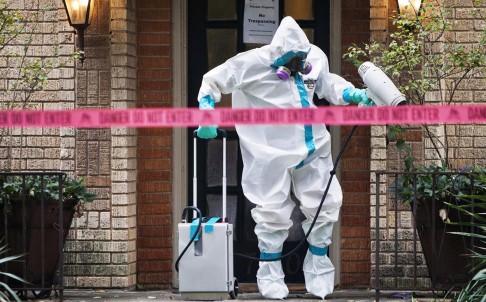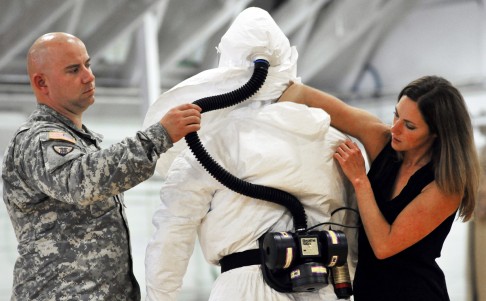US races to tighten policy on Ebola following second case in Texas
Areas with large West African communities scramble to adapt generic disaster response plans to disease and learn lessons from Texas
PUBLISHED : Monday, 13 October, 2014, 10:32pm
UPDATED : Tuesday, 14 October, 2014, 5:34am
Reuters in New York

A specialist member of staff disinfects the entrance to the home of a Texas health worker who contracted Ebola. Photo: Reuters
The mistakes in Dallas's handling of the first Ebola case diagnosed in the United States have revealed an uncomfortable reality: state and city plans for handling the deadly virus are based on generic recommendations for everything from measles to floods, hurricanes and dirty bombs.
Even before Sunday's news that a health worker who treated the Dallas case had herself contracted the disease, officials acknowledged they need to do more.
Checks with health departments in six states and cities that have large West African communities - Philadelphia, Boston, New York City, Minnesota, New Jersey, Maryland and Rhode Island - show that they are desperately scrambling to adapt those generic plans to Ebola.
If they are not able to stay one step ahead of any cases, then lapses that characterised Ebola patient Thomas Eric Duncan's treatment in Dallas could recur.
Errors also led to the infection of a Texas health worker who treated Duncan. The infected worker, identified as a woman but not named by authorities, is believed to be the first person to contract the disease in the United States.
In terms of preparedness around the US, there is a lot to do: hospital drills, 911 emergency operator guidelines, quarantine rules, even details such as checking that plastic body bags meet the minimum thickness - 150 micrometres - recommended by the US Centres for Disease Control and Prevention.

James Knight and Ondraya Frick from U.S. Army Medical Research Institute of Infectious Diseases train U.S. Army soldiers from the 101st Airborne Division, who are earmarked for the fight against Ebola, before their deployment to West Africa, at Fort Campbell, Kentucky. Photo: Reuters
While departments said they were confident they would be able to identify, treat and contain Ebola, "nobody is charged with reviewing all 2,800 departments' plans", said Jack Herrmann, chief of public health programmes at the National Association of County & City Health Officials.
Among the lapses in Dallas, even before the case of the infected health worker, were the hospital's failure to admit Duncan when he first went to the emergency room and told staff there of his recent arrival from Liberia, delaying his treatment by at least two crucial days.
It took almost a week to clean the apartment where he stayed. And health officials briefly lost track of a homeless man who they were monitoring for Ebola symptoms.
While the CDC advises states on 15 "preparedness capabilities" they need to respond to public health emergencies, the list was last evaluated in 2011 and is fairly general - "emergency operations coordination" and "information sharing".
Local health departments have varying capabilities, preventing the CDC from crafting a single national plan, so it provides guidelines. Thus local authorities decide what is an "adequate" stockpile of protective gear, and which community and other "partners" need to be involved.
That reflected the common view that states and localities should lead health emergencies as a matter of right and responsibility, said Dr Michael Osterholm of the University of Minnesota and an expert on infectious diseases.
The closest things to nationwide plans are those developed for pandemic flu and for so-called "all hazards emergencies", said Herrmann.
According to National Nurses United, 76 per cent of nurses surveyed say their hospital has not communicated to them any policy regarding potential admission of Ebola patients, 85 per cent say their hospital has not provided education sessions where nurses can ask questions, and just over one third say their hospital has insufficient supplies of face shields and impermeable gowns.
___________________________________________________
It's a dog's life: Dallas mayor says Ebola-infected health care worker's pet will not be put down
A Dallas dog won't be destroyed for cohabitating with an Ebola-infected health care worker, according to the city's mayor.
Unlike Excalibur, the dog owned by a Spanish nursing assistant infected with Ebola that was euthanised last week, the Dallas dog will be sent to a new location to await its owner's recovery.
"The dog's very important to the patient and we want it to be safe," Dallas Mayor Mike Rawlings said.
Animal-rights activists had protested all night outside the apartment block in Alcorcon, near Madrid, where Excalibur lived with the health worker diagnosed with Ebola on October 6. There's no evidence pets play an active role in transmitting the deadly viral disease to humans, according to the World Organisation for Animal Health.
"It's just because of the 'Ebola' word that seems to have everyone panicked," said Yolanda Eisenstein, an adjunct professor at the Southern Methodist University Dedman School of Law in Dallas. "But if the dog is not going to transfer the virus to people, I don't see the reason to euthanise the dog except to feed people's paranoia." Excalibur wasn't tested for Ebola before he was destroyed.
The Ebola virus jumps to humans from infected animals including chimpanzees, gorillas and bats.
Bloomberg
